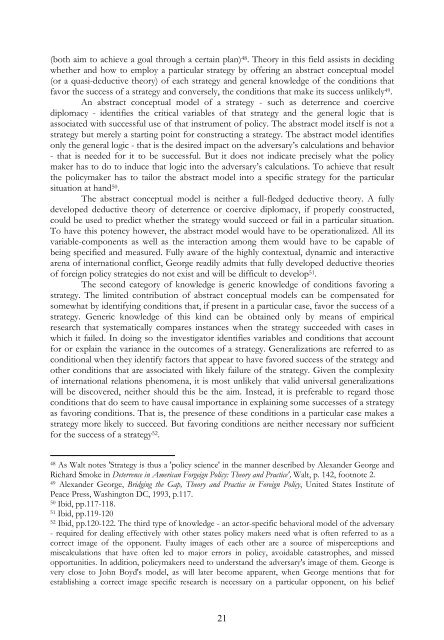Science, Strategy and War The Strategic Theory of ... - Boekje Pienter
Science, Strategy and War The Strategic Theory of ... - Boekje Pienter
Science, Strategy and War The Strategic Theory of ... - Boekje Pienter
You also want an ePaper? Increase the reach of your titles
YUMPU automatically turns print PDFs into web optimized ePapers that Google loves.
(both aim to achieve a goal through a certain plan) 48 . <strong>The</strong>ory in this field assists in decidingwhether <strong>and</strong> how to employ a particular strategy by <strong>of</strong>fering an abstract conceptual model(or a quasi-deductive theory) <strong>of</strong> each strategy <strong>and</strong> general knowledge <strong>of</strong> the conditions thatfavor the success <strong>of</strong> a strategy <strong>and</strong> conversely, the conditions that make its success unlikely 49 .An abstract conceptual model <strong>of</strong> a strategy - such as deterrence <strong>and</strong> coercivediplomacy - identifies the critical variables <strong>of</strong> that strategy <strong>and</strong> the general logic that isassociated with successful use <strong>of</strong> that instrument <strong>of</strong> policy. <strong>The</strong> abstract model itself is not astrategy but merely a starting point for constructing a strategy. <strong>The</strong> abstract model identifiesonly the general logic - that is the desired impact on the adversary’s calculations <strong>and</strong> behavior- that is needed for it to be successful. But it does not indicate precisely what the policymaker has to do to induce that logic into the adversary’s calculations. To achieve that resultthe policymaker has to tailor the abstract model into a specific strategy for the particularsituation at h<strong>and</strong> 50 .<strong>The</strong> abstract conceptual model is neither a full-fledged deductive theory. A fullydeveloped deductive theory <strong>of</strong> deterrence or coercive diplomacy, if properly constructed,could be used to predict whether the strategy would succeed or fail in a particular situation.To have this potency however, the abstract model would have to be operationalized. All itsvariable-components as well as the interaction among them would have to be capable <strong>of</strong>being specified <strong>and</strong> measured. Fully aware <strong>of</strong> the highly contextual, dynamic <strong>and</strong> interactivearena <strong>of</strong> international conflict, George readily admits that fully developed deductive theories<strong>of</strong> foreign policy strategies do not exist <strong>and</strong> will be difficult to develop 51 .<strong>The</strong> second category <strong>of</strong> knowledge is generic knowledge <strong>of</strong> conditions favoring astrategy. <strong>The</strong> limited contribution <strong>of</strong> abstract conceptual models can be compensated forsomewhat by identifying conditions that, if present in a particular case, favor the success <strong>of</strong> astrategy. Generic knowledge <strong>of</strong> this kind can be obtained only by means <strong>of</strong> empiricalresearch that systematically compares instances when the strategy succeeded with cases inwhich it failed. In doing so the investigator identifies variables <strong>and</strong> conditions that accountfor or explain the variance in the outcomes <strong>of</strong> a strategy. Generalizations are referred to asconditional when they identify factors that appear to have favored success <strong>of</strong> the strategy <strong>and</strong>other conditions that are associated with likely failure <strong>of</strong> the strategy. Given the complexity<strong>of</strong> international relations phenomena, it is most unlikely that valid universal generalizationswill be discovered, neither should this be the aim. Instead, it is preferable to regard thoseconditions that do seem to have causal importance in explaining some successes <strong>of</strong> a strategyas favoring conditions. That is, the presence <strong>of</strong> these conditions in a particular case makes astrategy more likely to succeed. But favoring conditions are neither necessary nor sufficientfor the success <strong>of</strong> a strategy 52 .48 As Walt notes '<strong>Strategy</strong> is thus a 'policy science' in the manner described by Alex<strong>and</strong>er George <strong>and</strong>Richard Smoke in Deterrence in American Forgeign Policy: <strong>The</strong>ory <strong>and</strong> Practice', Walt, p. 142, footnote 2.49 Alex<strong>and</strong>er George, Bridging the Gap, <strong>The</strong>ory <strong>and</strong> Practice in Foreign Policy, United States Institute <strong>of</strong>Peace Press, Washington DC, 1993, p.117.50 Ibid, pp.117-118.51 Ibid, pp.119-12052 Ibid, pp.120-122. <strong>The</strong> third type <strong>of</strong> knowledge - an actor-specific behavioral model <strong>of</strong> the adversary- required for dealing effectively with other states policy makers need what is <strong>of</strong>ten referred to as acorrect image <strong>of</strong> the opponent. Faulty images <strong>of</strong> each other are a source <strong>of</strong> misperceptions <strong>and</strong>miscalculations that have <strong>of</strong>ten led to major errors in policy, avoidable catastrophes, <strong>and</strong> missedopportunities. In addition, policymakers need to underst<strong>and</strong> the adversary's image <strong>of</strong> them. George isvery close to John Boyd's model, as will later become apparent, when George mentions that forestablishing a correct image specific research is necessary on a particular opponent, on his belief21
















